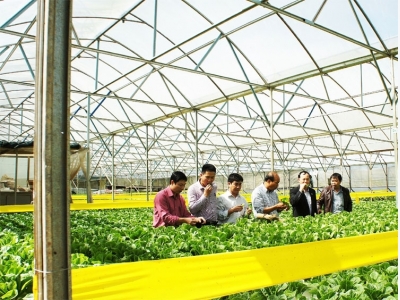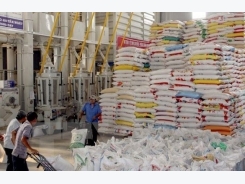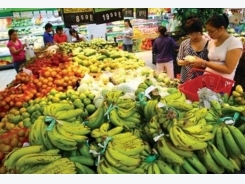Government seeking to boost foreign investment in agriculture

According to the Ministry of Planning and Investment’s data, the country attracted 522 projects worth US$3.6 billion in foreign direct investment (FDI) in agriculture by March 2017. These account for 2.26 percent of total FDI projects in the country, and 1.2 percent of total capital invested by foreigners.
Incommensurate with potential
Although FDI inflows to agriculture account for a small portion of the total foreign investment in Vietnam, it has been growing gradually – from 0.6 percent in 2012, to 0.8 percent in 2013, 0.5 percent in 2014, 1 percent in 2015 and 1.2 percent in 2016.
According to the Ministry of Planning and Investment’s Foreign Investment Agency, the Vietnamese agricultural sector has great potential and advantages. However FDI inflows remain limited and are mainly focused in wood and forestry processing, livestock breeding and animal feed processing.
Experts say that FDI inflows in agriculture have not reached their targets because the agricultural sector has not built up specific projects. In addition, the Vietnamese agricultural sector is fragmented, small-scale and self-sufficient, and lacking sustainable linkages and suitable policies.
New moves
In the draft strategy for increasing FDI attraction in agriculture by 2030, the Ministry of Agriculture and Rural Development forecasts that investments will grow to US$5 billion by 2020 and US$8 billion by 2030. To achieve the goals, the Vietnamese agricultural sector needs to have long-term strategies and directions.
Regarding the legal framework, the Investment Law 2014, the Enterprise Law 2014 and legal documents of the two laws have significantly reduced the differences between foreign investors, FDI businesses and domestic investors and enterprises. The legal framework has become clearer and more open to investors and businesses at home and abroad. In addition, mechanisms and policies to overcome difficulties for investment in agricultural development, especially in promoting high technology, strengthening clean agriculture, improving quality of human resources and developing the value chain have gradually proven efficiency.
The Ministry of Agriculture and Rural Development is urgently finalizing the draft strategy for increasing FDI in agriculture, in coordination with the Ministry of Planning and Investment. The two are reviewing, amending and supplementing regulations that are no longer in line with Decree 210/2013/ND-CP dated December 19, 2013 on encouraging businesses to strengthen investment in agriculture.
Four agricultural sectors are being targeted for increased foreign investment. These include production and development of plant and livestock varieties; production of auxiliary materials to create high added value, and production of supplementary food serving animal feed production and environmental treatment technology; processing of agriculture, forestry and fishery products to produce goods with high added value; and production of veterinary drugs and biological plant protection drugs.
Public-private partnership (PPP) investments are also an important model being prioritized by the Ministry of Agriculture and Rural Development to strengthen investment in agriculture. This strategy is based on the assumption that businesses are the most dynamic link in the value chain and are able to resolve problems plaguing the agricultural sector.
According to the Ministry of Planning and Investment’s Foreign Investment Agency, many localities and domestic businesses have adopted projects to cooperate with foreign investors in the agricultural sector. In particular, some big investors from Japan and the Republic of Korea have expressed their interest in Vietnam’s agricultural projects.
According to the Japan External Trade Organization (JETRO), the number of Japanese firms wishing to implement agro-fishery projects in Vietnam has been growing strongly. Many are conducting market surveys. For example, the Kato Group is cooperating with the south-central province of Binh Dinh in a US$771,000 tuna-fishing project, which will run until June 2020. In addition, the OTA Kaki Company has been cooperating with the Central Highlands province of Lam Dong on a project to develop a high-quality flower market with an effective distribution system. In addition to Japanese firms, Republic of Korea companies have also been implementing investment promotion programs in agriculture in Mekong Delta provinces, such as Can Tho and Hau Giang.
To strengthen FDI in agriculture in a sustainable manner, in addition to the guiding role of the government, the agricultural sector needs to invest more in high technology and improve food safety and hygiene. Close linkages between farmers and businesses are also necessary.
Related news
Tools

Phối trộn thức ăn chăn nuôi

Pha dung dịch thủy canh

Định mức cho tôm ăn

Phối trộn phân bón NPK

Xác định tỷ lệ tôm sống

Chuyển đổi đơn vị phân bón

Xác định công suất sục khí

Chuyển đổi đơn vị tôm

Tính diện tích nhà kính

Tính thể tích ao




 Vietnam fruit producers struggle to enter export markets
Vietnam fruit producers struggle to enter export markets  Agro-forestry and fishery exports up 13% in first…
Agro-forestry and fishery exports up 13% in first…